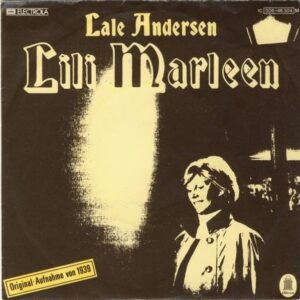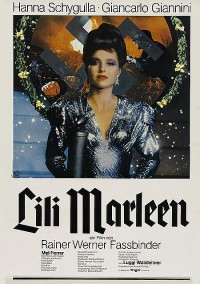
Pour ce 7e épisode, nous allons évoquer le premier tube Hergestellt in Deutschland (made in Germany) qui dépassa le million d’exemplaires.
You can find a summary in English below.

Une version en anglais par Marlène Dietrich est ici


For my Friends who don’t speak French a summary in English. I hope it can help to follow what I say :
« Lili Marleen » is a song with an extraordinary destiny, sometimes described as the first planetary hit. Except perhaps in Germany, today we mainly know Marlène Dietrich’s version in German and English. Born in Berlin in 1901, Marlène Dietrich left for Hollywood after the phenomenal success of the film The Blue Angel (Der blaue Engel). Fiercely anti-Nazi, she obtained American citizenship in 1939. For three years, she would encourage soldiers traveling through the fields of battle in a jeep, on a motorcycle or even on foot under the fire of projectiles. From 1944, she sang for the American and British troops stationed in the United Kingdom, before accompanying the 3rd American army of General Patton. She will give for the soldiers more than 60 concerts. She will of course sing ‘Lili Marlene’ there, instead of the original title ‘Lili Marleen’ and the lyrics (in the English version the soldier no longer dies at the end).
The singer’s commitment will inspire the group Noir Désir on the album Tostaki
Oh Marlène, c’est la haine / Qui nous a emmenés là
Oh Marlène / Dans tes veines / Coule l’amour des soldats
Et quand ils meurent ou s’endorment / C’est la chaleur de ta voix
Qui les apaise, et les traîne / Jusqu’en dehors des combats
Oh Marlène, it’s hate / Who took us there
Oh Marlène / In your veins / Flows the love of soldiers
And when they die or fall asleep / It’s the warmth of your voice
Who appeases them, and drags them / Out of the fights
But let’s come to the original version.
Sample of the original version by Lale Andersen
The story of « Lili Marleen », or rather « Lied eines jungen Wachtpostens » (in English « Song of a young sentry »), begins in 1915 when the poet Hans Leip, wrote a poem the day before of his departure for the Russian front. It describes the torments of a young sentry thinking of his beloved Lily Marleen. In reality Lili and Marleen were two different people, but as « Les inconnus » (famous French humorists) would say, that’s none of our business!
In 1937, the composer Rudolf Zink gave his mistress, Lale Andersen, a melancholy score for this song, which she would sing in Berlin cabarets. Lale Andersen will record on disc in 1938 a version with music written by the composer Norbert Schultze. Then in 1939 a version with orchestra. The song goes more or less unnoticed with barely a few hundred copies sold.
Several legends accompany the revival of the title.
What seems certain is that in 1941, the Third Reich installed a radio broadcasting in medium waves in Belgrade to boost the mood of its army. The record warehouse having been destroyed, there are still 60 records including Lili Marleen. The track is used as the end credits of a very popular autograph show with German soldiers.
At the end of 1942, Lili Marleen was temporarily banned from Germany. On one hand, because Goebbels finds the title depressive, especially the last stanza where the poet evokes the death of the soldier. On the other hand, because after having wanted to use the popularity of the singer, the Nazis did not like either the personality of Lale Andersen or her relations.
Inspired by the life of Lale Andersen, Fassbinder would shoot the 1981 film Lili Marlene with Hanna Schygulla in the title role.
Although Nazi propaganda now forbids Lale Andersen from performing on stage or participating in radio broadcasts, the song nevertheless remains in favor with powerful Party figures. In particular those of Rommel, « the desert fox », whose troops in Libya (the Afrika Korps) managed to pick up radio from Belgrade. English soldiers are reported to have often shouted « Louder please, comrades » to the German trenches hearing the song on the radio every evening at 10 p.m., a kind of fraternization between the English troops and the German troops, the melancholy thoughts of a young sentry thinking of his fiancée moving the soldiers on both sides. The song was then adapted into English and used by Allied propaganda, which made it the song of Freedom. It was at this time that, as a symbol, victory changed sides. This is how the song conquered the whole world. General Eisenhower said that Hans Leip was the only German who brought joy to the whole world during the war.
Before letting you find Lili Marlene under the lantern, I say see you soon for a new episode of Ils Ont Repris Ma Chanson.